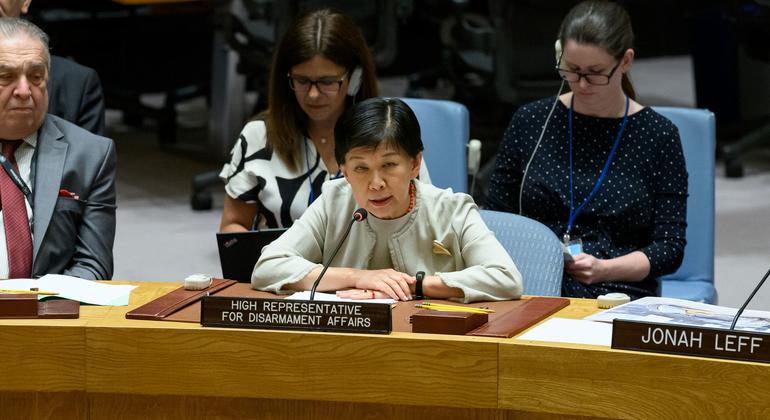Ms. Nakamitsu noted that in recent months there had been allegations of transfers of ballistic missiles and ammunition from the DPRK (more commonly known as North Korea) to Russia, in violation of Council resolutions, allegedly for use in Moscow’s continuing invasion of Ukraine.
“UN Security Council sanctions regimes are at the top of such international collective efforts for the maintenance of international peace and security, and to prevent illicit transfer of arms,” she said.
“I recall that the relevant Security Council resolutions are legally binding on all UN Member States.”
Sanctions committee
Ms. Nakamitsu also referred to the final report of the Panel of Experts that supported the Committee overseeing the sanctions measures imposed by the Security Council in resolution 1718.
The report stated that the “Panel is investigating reports from Member States about supplies by the [DPRK] of conventional arms and munitions in contravention of sanctions.”
The Panel was reviewing, before the expiration of its mandate, a report by the Government in Kyiv on missile debris recovered in Ukraine, following information about short-range ballistic missiles manufactured in the DPRK and used by Russian forces, she said.
Although the mandate of the Panel of Experts expired on 30 April, the 1718 Committee continues its work and will oversee the implementation of the sanctions regime.
States must act responsibly
Ms. Nakamitsu stated that importing, transit, producing, and exporting states “must act responsibly at every step” along the arms and ammunition transfer chain to prevent diversion, illicit trafficking, and misuse.
“Any transfer of weapons and ammunition must be compliant with the applicable international legal framework, including of course, relevant Security Council resolutions and the sanctions regimes that they establish,” she said.
“As the Secretary-General has stated, any relationship that any country has with [DPRK], including [Russia], must entirely abide by the relevant Security Council sanctions,” she recalled.
DPRK’s nuclear programme
Further in her briefing, Ms. Nakamitsu noted that the DPRK continues its nuclear weapons programme and development of its means of delivery, having “significantly increased” ballistic missile launches in recent years.
Since 2022, the DPRK conducted over 100 launches of ballistic missiles, including solid-fuel inter-continental ballistic missiles and space launch vehicles using ballistic missile technology.
These were in violation of several Security Council resolutions, Ms. Nakamitsu said.
She also referred to the report from nuclear watchdog, the International Atomic Energy Agency (IAEA), that the discharge of warm water from the cooling system of the Light Water Reactor at Yongbyon was indicative that the reactor has reached criticality.
“The IAEA also observed indications of the ongoing operation of the reported centrifuge enrichment facility in Yongbyon, and expansion of another facility in Kangson Complex,” she said.
Additionally, while there were no indications of change at the Nuclear Test Site at Punggye-ri recently, the site remains occupied.
A wide view of the Security Council meeting on the Democratic People’s Republic of Korea (DPRK).
Malicious cyber activities
Ms. Nakamitsu also expressed concern over the reports of malicious cyber activities attributed to Pyongyang-affiliated actors, noting that malicious activity continues through the targeting of cryptocurrency-related companies.
Other trends observed include the targeting of supply chains.
She stressed that such reported actions were not in line with the General Assembly framework for responsible State behaviour in the use of information and communication technologies (ICT).
Instead, such acts imperil international peace and security and undermines trust and stability between States, she said.
Diplomacy, the only path to peace
In conclusion, Ms. Nakamitsu reiterated the call for DPRK to comply fully with its international obligations and urged all States to avoid actions that could escalate tensions.
“Diplomatic engagement remains the only pathway to sustainable peace and the complete and verifiable denuclearization of the Korean Peninsula,” she said, urging the resumption of talks and fostering an environment conducive to dialogue.



